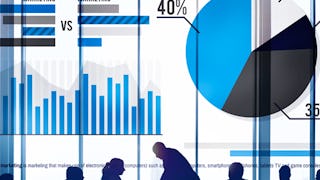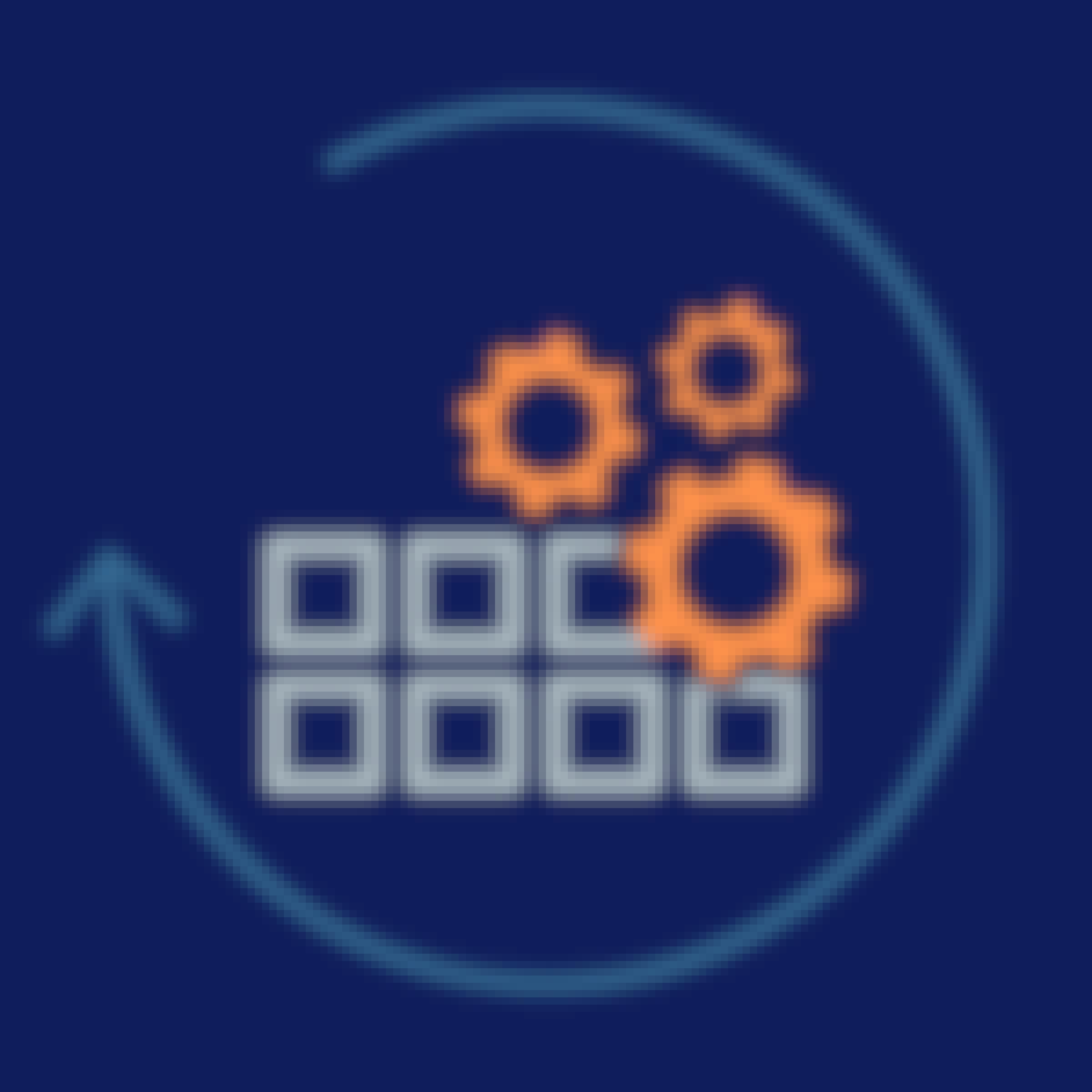- Browse
- Analysis
Analysis Courses
Analysis courses can help you learn data interpretation, statistical methods, and predictive modeling. You can build skills in critical thinking, data visualization, and hypothesis testing. Many courses introduce tools like Excel, R, and Python, that support analyzing datasets and automating processes. You'll also explore key topics such as regression analysis, time series forecasting, and data mining techniques, equipping you to make informed decisions based on quantitative insights.
Popular Analysis Courses and Certifications
 Status: Free TrialFree TrialJ
Status: Free TrialFree TrialJJohns Hopkins University
Skills you'll gain: Calculus, Integral Calculus, Numerical Analysis, Advanced Mathematics, Mathematical Theory & Analysis, Data Integration, Mathematical Modeling, Data Analysis, Vector Databases, Probability, Geometry, Applied Mathematics, Mechanics, Engineering Calculations, Spatial Data Analysis, Derivatives, Physics
4.8·Rating, 4.8 out of 5 stars140 reviewsIntermediate · Specialization · 3 - 6 Months
 Status: Free TrialFree TrialT
Status: Free TrialFree TrialTTecnológico de Monterrey
Skills you'll gain: Web Analytics, Google Analytics, Social Media, Search Engine Marketing, Social Media Marketing, Marketing Analytics, Market Research, Digital Marketing, Marketing Effectiveness, Content Performance Analysis, Analytical Skills, Online Advertising, Social Media Strategy, Email Marketing, Customer Data Management, Analytics, Target Audience, Key Performance Indicators (KPIs), Social Network Analysis, Facebook
4.7·Rating, 4.7 out of 5 stars277 reviewsIntermediate · Specialization · 1 - 3 Months
 C
CCoursera
Skills you'll gain: Financial Reporting, Financial Statements, Accounting Software, Financial Accounting, Ledgers (Accounting), Financial Statement Analysis, Accounting Records, Accounting, Generally Accepted Accounting Principles (GAAP), Balance Sheet, Income Statement, Finance, Business Analysis
4.6·Rating, 4.6 out of 5 stars105 reviewsIntermediate · Guided Project · Less Than 2 Hours
 Status: Free TrialFree TrialB
Status: Free TrialFree TrialBBanco Interamericano de Desarrollo
Skills you'll gain: Risk Analysis, Project Risk Management, Risk Management, Analysis, Mitigation, Hazard Analysis, Disaster Recovery, Climate Change Adaptation, Civil Engineering, Construction, Economic Development
4.6·Rating, 4.6 out of 5 stars248 reviewsBeginner · Course · 1 - 4 Weeks
 Status: PreviewPreviewU
Status: PreviewPreviewUUniversity of Michigan
Skills you'll gain: Brand Strategy, Branding, Brand Awareness, Brand Management, Personal Attributes, Self-Awareness, Storytelling, Value Propositions, Competitive Analysis, Concision, Creativity, Case Studies
4.7·Rating, 4.7 out of 5 stars161 reviewsBeginner · Course · 1 - 4 Weeks
 Status: Free TrialFree TrialU
Status: Free TrialFree TrialUUniversidad Nacional Autónoma de México
Skills you'll gain: Business Mathematics, Financial Management, Finance, Financial Modeling, Investment Management, Capital Budgeting, Financial Analysis, Return On Investment, Loans, Investments, Cash Flows, Corporate Finance
4.8·Rating, 4.8 out of 5 stars1.3K reviewsIntermediate · Course · 1 - 3 Months
 Status: Free TrialFree Trial
Status: Free TrialFree TrialSkills you'll gain: Data Warehousing, MongoDB, IBM Cognos Analytics, Extract, Transform, Load, NoSQL, Apache Spark, IBM DB2, Big Data, Dashboard, Business Intelligence, PySpark, Data Pipelines, Analytics, Databases, Database Design, Data Architecture, Apache Airflow, Relational Databases, SQL, Python Programming
4.7·Rating, 4.7 out of 5 stars141 reviewsAdvanced · Course · 1 - 3 Months
 Status: Free TrialFree TrialA
Status: Free TrialFree TrialAAutomatic Data Processing, Inc. (ADP)
Skills you'll gain: Recruitment, Talent Pipelining, Professional Networking, Applicant Tracking Systems, Recruitment Strategies, Relationship Building, Talent Sourcing, Compensation and Benefits, Job Analysis, Talent Acquisition, Consultative Approaches, Process Improvement, Change Management, Coordination, Key Performance Indicators (KPIs), Performance Improvement, Performance Reporting, Market Research, Performance Analysis, Full Cycle Recruitment
4.8·Rating, 4.8 out of 5 stars60 reviewsBeginner · Professional Certificate · 3 - 6 Months
 Status: Free TrialFree TrialD
Status: Free TrialFree TrialDDuke University
Skills you'll gain: MLOps (Machine Learning Operations), Responsible AI, Artificial Intelligence and Machine Learning (AI/ML), PyTorch (Machine Learning Library), Containerization, Tensorflow, Rust (Programming Language), Microsoft Copilot, DevOps, Hugging Face, Applied Machine Learning, Cloud Solutions, CI/CD, Machine Learning, Serverless Computing, Docker (Software), GitHub, Big Data
4.1·Rating, 4.1 out of 5 stars217 reviewsAdvanced · Course · 1 - 3 Months
 Status: Free TrialFree TrialU
Status: Free TrialFree TrialUUniversity of Alberta
Skills you'll gain: Sprint Retrospectives, Scrum (Software Development), Software Technical Review, Agile Project Management, Agile Software Development, Software Quality Assurance, Agile Methodology, User Story, Requirements Analysis, Usability Testing, User Research
4.7·Rating, 4.7 out of 5 stars1.7K reviewsMixed · Course · 1 - 4 Weeks
 Status: Free TrialFree TrialU
Status: Free TrialFree TrialUUniversity of Michigan
Skills you'll gain: Investment Management, Wealth Management, Asset Management, Investments, FinTech, Financial Trading, Portfolio Management, Artificial Intelligence, Big Data, Financial Market, Artificial Neural Networks, Automation, Machine Learning
4.7·Rating, 4.7 out of 5 stars420 reviewsBeginner · Course · 1 - 4 Weeks
 Status: Free TrialFree TrialB
Status: Free TrialFree TrialBBoard Infinity
Skills you'll gain: Selling Techniques, Business, Marketing, Economics, Advertising, Market Dynamics, Case Studies, Business Solutions, Market Analysis, Product Strategy, Business Planning, Complex Problem Solving
4.4·Rating, 4.4 out of 5 stars30 reviewsBeginner · Specialization · 1 - 3 Months
In summary, here are 10 of our most popular analysis courses
- Integral Calculus through Data and Modeling: Johns Hopkins University
- Analíticas de Marketing Digital: Tecnológico de Monterrey
- Financial Accounting Explained: Coursera
- Natural Disaster Risk in Infrastructure Projects: Banco Interamericano de Desarrollo
- Personal Branding: Stand Out and Succeed : University of Michigan
- Matemáticas financieras: Universidad Nacional Autónoma de México
- Data Engineering Capstone Project: IBM
- ADP AIRS® Entry-Level Recruiter: Automatic Data Processing, Inc. (ADP)
- DevOps, DataOps, MLOps: Duke University
- Reviews & Metrics for Software Improvements: University of Alberta










